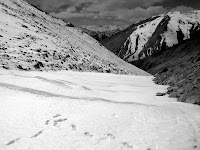Text by Anita Pratap & Photographs by Mahesh Bhat
 Changla artificial glacier: The highest watershed project in the world. It feeds several villages down stream in Ladakh. (Photograph By Mahesh Bhat)
Changla artificial glacier: The highest watershed project in the world. It feeds several villages down stream in Ladakh. (Photograph By Mahesh Bhat)In the raucous market place (read the globalized world), glam exteriority has encroached upon our consciousness and conquered every available space- be it the media, our sartorial sense, our attitudes, purchasing habits, culture etc.. . As a consequence the traditional Gandhian values, which were not sexy enough in the first place, have slowly been obliterated from our perception of what holds good. Who frankly has the time for concepts like selfless giving shorn of fame and media attention? It is so passé. So the book “Unsung” by journalist Anita Pratap and photographer Mahesh Bhat comes as a big surprise. The duo has chosen to capture the lives not of famous actors or cricketers but of ordinary people from different parts of the country. These unknown, “unsung” people have selflessly given of their time, energy and their lives to the happiness of others.
The story of Subhashini Mistry, a vegetable seller from Hanspukur, near Kolkata, who saved small amounts of money for twenty weary years to start a hospital for the poor, is heart rending and it ceaselessly nags you for your selfish stylish ways. Subhashini was married off at the age of twelve to Sadhan, an agriculture worker. He earned just Rs. 200 and with four children the couple struggled to make ends meet. In 1971, Sadhan was rushed to the Government hospital in Tollygunge, Kolkata for gastro enteritis. But the nurses and doctors refused to treat him because he was poor and he died as a result. A familiar story right? The story did not end with her husband’s death. Subhashini wowed she would build a hospital for the poor. And despite being dirt poor with four hungry children, she saved small amounts of money- Rs.100, Rs.50 towards her dream. Twenty years later she bought a plot and put up a shed and begged doctors to volunteer their service. Now after years of knocking on doors, the hospital has grown into a two- storied building which is absolutely free for the poor. She says, “What’s the use of material things like bangles and saris. We cant take them with us when we die. But the happy faces of the cured poor people have given me such joy and meaning in this life.”
George Pulikutiyil: "My mission is to make justice administration a mass movement. Protection of human rights should be part of people's culture." (Photograph by Mahesh Bhat)
Closer home the book focuses on George Pulikuthiyil in Thrissur. George Pulikuthiyil was formerly a priest but the priestly life of listening to the usual ritualistic confessions bored him and he felt “distanced from the everyday struggles of the ordinary people whom he yearned to serve.” So he gave up priesthood and looked without the walls of the church to find God and he took up a new cause to defend the defenceless. He studied law and started Jananeethi, an NGO to provide justice for the poor. Through Jananeethi, he fought for the rights of all sections of society, irrespective of caste, class and creed. He says, “My mission is to make justice administration a mass movement. Protection of human rights should be part of a people’s culture.”
Changla artificial glacier
The book even journeys to the cold hazardous terrains of Ladakh to showcase a man who makes artificial glaciers. If you thought “only God made glaciers” you are dead wrong because seventy-one year old Chewang Norphel makes glaciers to provide water for the water starved region of Ladakh. “Melting snows generate millions of gallons of water but it goes waste because it comes too late to Ladakh.” Cultivation in Ladakh is limited to a short season of spring and early summer but Ladakh receives water only in June and nothing grew in Ladakh till Norphel came up with his plan.
The book showcases people like Norphel and Pulikuthiyil- ordinary people with extraordinary ideas and a will to carry it through. Says Anita Pratap, who travelled to the four corners of the country to research these ordinary heroes, “Mahesh and I have chosen people who have dedicated their whole lives to the service of others. And we have ensured that there is a fair representation of geographical, religious and different causes in the book. What is interesting is that many of these people spoke about Gandhiji and his book “My story of experiments with truth.” I feel the book should be introduced to students as compulsory reading material. It took us three years to put Unsung together and it has been worth the effort.”
“Unsung” is a slim book, easy to read and the photographs by Mahesh Bhat in stark black and white are powerful and create the right tone. It is an inspiring read for both adults and adolescents. The proceeds of the sales go to the untiring efforts of these Unsung Heroes.
(First published by The New Indian Express)


